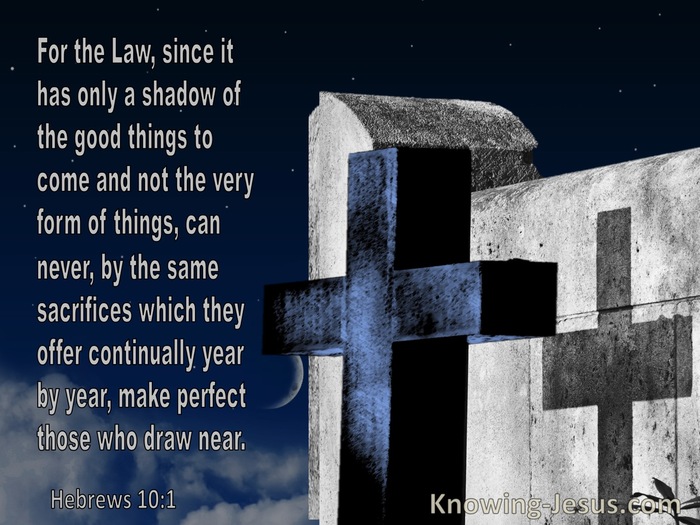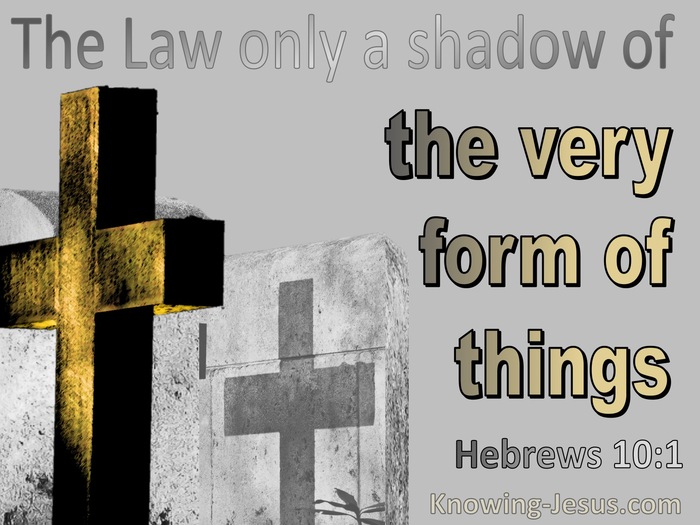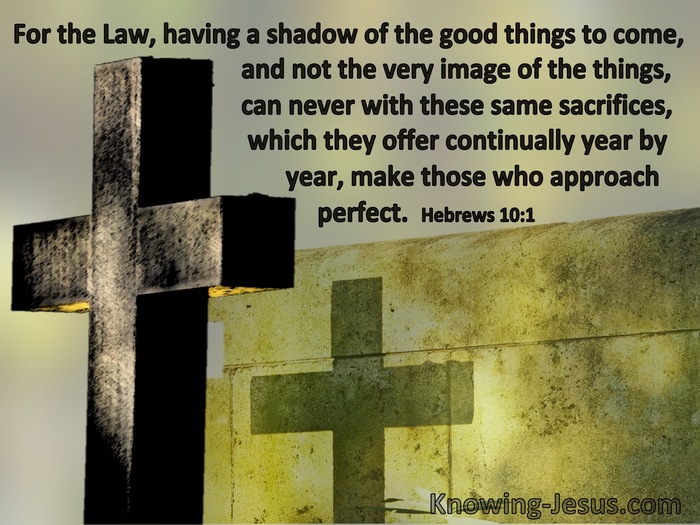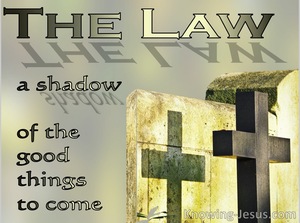Parallel Verses
Montgomery New Testament
For the Law, being only a shadow of the good things to come, and not their very substance, its priests cannot with the same sacrifice which year after year they offer continually, make perfect those who draw near.
New American Standard Bible
For the Law, since it has only
King James Version
For the law having a shadow of good things to come, and not the very image of the things, can never with those sacrifices which they offered year by year continually make the comers thereunto perfect.
Holman Bible
Since the law has only a shadow of the good things
International Standard Version
For the Law, being only a reflection of the blessings to come and not their substance, can never make perfect those who come near by the same sacrifices repeatedly offered year after year.
A Conservative Version
For the law having a shadow of the good things that are coming, not the same substance of the events, with the same sacrifices that are offered continually each year, they are never able to fully perfect those who are approaching.
American Standard Version
For the law having a shadow of the good things to come, not the very image of the things, can never with the same sacrifices year by year, which they offer continually, make perfect them that draw nigh.
Amplified
For since the Law has only a shadow [just a pale representation] of the good things to come—not the very image of those things—it can never, by offering the same sacrifices continually year after year, make
An Understandable Version
For the law of Moses was [only] a foreshadow of the good things that [were] to come [i.e., in the Messianic age], not the exact image of those things. It can never, by the same sacrifices, continually offered year after year, make [morally] perfect those who draw near [to God in worship].
Anderson New Testament
For the law, having a shadow of good things to come, and not the very image of the things, can never, with the same sacrifices, which they offer year by year continually, make a perfect expiation for those who come to them:
Bible in Basic English
For the law, being only a poor copy of the future good things, and not the true image of those things, is never able to make the people who come to the altar every year with the same offerings completely clean.
Common New Testament
For since the law has only a shadow of the good things to come and not the true form of these realities, it can never, by the same sacrifices which are continually offered year after year, make perfect those who draw near.
Daniel Mace New Testament
For the law being only an allusion to a future dispensation that was more excellent, and not an exact imitation of such a state, cannot by the anniversary sacrifices, which are offered, entirely purify those that present themselves.
Darby Translation
For the law, having a shadow of the coming good things, not the image itself of the things, can never, by the same sacrifices which they offer continually yearly, perfect those who approach.
Godbey New Testament
For the law having the shadow of good things to come, not the real image of the things, annually with the same sacrifices which they offer continually, is by no means able to make perfect those coming to it:
Goodspeed New Testament
For while the Law foreshadowed the blessings that were to come, it did not fully express them, and so the priests by offering the same sacrifices endlessly year after year cannot wholly free those who come to worship from their sins.
John Wesley New Testament
For the law having a shadow of good things to come, not the very image of the things, can never with the same sacrifices which they offer year by year continually, make the comers thereunto perfect.
Julia Smith Translation
For the law having a shadow of good things about to be, not the same image of the things, with these sacrifices which they bring in yearly in continuance never can render perfect them coming thereto.
King James 2000
For the law having a shadow of good things to come, and not the very image of the things, can never with those sacrifices which they offered year by year continually make the ones approaching perfect.
Lexham Expanded Bible
For the law, possessing a shadow of the good [things] that are about to come, not the form of things itself, [is] never able {year by year} by means of the same sacrifices which they offer without interruption to make perfect those who draw near.
Modern King James verseion
For the Law which has a shadow of good things to come, not the very image of the things, appearing year by year with the same sacrifices, which they offer continually, they are never able to perfect those drawing near.
Modern Spelling Tyndale-Coverdale
For the law - which hath but the shadow of good things to come, and not the things in their own fashion - can never with the sacrifices which they offer year by year continually make the comers thereunto perfect.
Moffatt New Testament
For as the Law has a mere shadow of the bliss that is to be, instead of representing the reality of that bliss, it never can perfect those who draw near with the same annual sacrifices that are perpetually offered.
NET Bible
For the law possesses a shadow of the good things to come but not the reality itself, and is therefore completely unable, by the same sacrifices offered continually, year after year, to perfect those who come to worship.
New Heart English Bible
For the Law, having a shadow of the good to come, not the very image of the things, can never with the same sacrifices year by year, which they offer continually, make perfect those who draw near.
Noyes New Testament
For the Law but shadowing forth the good things to come, and not having the very image of the things, can never with the same sacrifices which they offer year by year continually make those who come with them perfect.
Sawyer New Testament
For the law having a shadow of the good things that were to come, not the very likeness of the things, could not by the sacrifices which they offered continually every year perfect the offerers;
The Emphasized Bible
For the law, having in a shadow of the destined good things, not the very image of the things, they can never, with the same sacrifices which year by year they offer evermore, make them who approach, perfect;
Thomas Haweis New Testament
NOW the law, having a shadow of the good things which were to come, not the very substance of the things, cannot possibly, by the same sacrifices which they offer year by year continually, make those perfect who approach [God];
Twentieth Century New Testament
The Law, though able to foreshadow the Better System which was coming, never had its actual substance. Its priests, with those sacrifices which they offer continuously year after year, can never make those who come to worship perfect.
Webster
For the law having a shadow of good things to come, and not the very image of the things, can never with those sacrifices which they offered year by year continually make the comers to them perfect.
Weymouth New Testament
For, since the Law exhibits only an outline of the blessings to come and not a perfect representation of the things themselves, the priests can never, by repeating the same sacrifices which they continually offer year after year, give complete freedom from sin to those who draw near.
Williams New Testament
For since the law cast only a shadow of the blessings to come and did not possess the reality itself of those blessings, the priests with the same sacrifices that are perpetually offered year after year cannot make perfect those who come to worship.
World English Bible
For the law, having a shadow of the good to come, not the very image of the things, can never with the same sacrifices year by year, which they offer continually, make perfect those who draw near.
Worrell New Testament
For the law, having a shadow of the good things to come, not the very likeness of the things, can never, with the same sacrifices, which they offer year by year continually, perfect those who come to them;
Worsley New Testament
For the law having but a faint shadow of good things to come, and not the full image of the things, can never, even by the great annual sacrifices which they offer statedly, make the comers thereunto perfect.
Youngs Literal Translation
For the law having a shadow of the coming good things -- not the very image of the matters, every year, by the same sacrifices that they offer continually, is never able to make perfect those coming near,
Themes
Ceremonialism » Laws of, abolished
Desires » What the lord does not desire
Jews, the » Religion of, typical
Law » Bondage of » Ceremonial abolished in Christ
the Law of moses » Christ » Fulfilled all types and shadows of
the Law of moses » A shadow of good things to come
Offerings » Animal sacrifices » A type of Christ
Pleasure » What the lord has no pleasure in
Reconciliation » Jesus Christ reconciling man to God
Sacrifice » The lord not desiring sacrifices
Sacrifices » Were typical of Christ's sacrifice
Sacrifices » Could not take away sin
Sacrifices » Were offered » Under the mosaic dispensation
Sanctification » Everyone being sanctified through the blood of jesus Christ
The bible » The law part of » Ceremonial abolished in Christ
Types » Of the saviour » The sacrifices
Interlinear
Agathos
Prosphero
References
American
Easton
Fausets
Hastings
Morish
Watsons
Word Count of 37 Translations in Hebrews 10:1
Prayers for Hebrews 10:1
Verse Info
Context Readings
Christ's Death Takes Away Sins
1 For the Law, being only a shadow of the good things to come, and not their very substance, its priests cannot with the same sacrifice which year after year they offer continually, make perfect those who draw near. 2 Otherwise would they not have ceased to be offered? Because the worshippers having been once cleansed, would have had no more consciousness of sin.
Cross References
Hebrews 9:11
But when Christ came, a High Priest of good things to come, he passed through the greater and more perfect tent not made with hands, that is to say, not of this material creation,
Colossians 2:17
These were a shadow of things to come, but the substance belongs to Christ.
Hebrews 9:23
While, then, it was necessary that the copies of the heavenly things should be cleansed by such sacrifices, the heavenly things themselves required nobler sacrifices than these.
Hebrews 7:18-19
For there is a setting aside of a foregoing commandment, because of its weakness and unprofitableness
Hebrews 9:8-9
The Holy Spirit teaching by this that the way into the Holiest has not yet been disclosed while the first tent is still standing.
Hebrews 9:25
Nor did he enter to offer himself repeatedly, as the high priest entered into the sanctuary, year after year, with blood that was not his own;
Hebrews 10:3-4
But on the other hand, in these sacrifices sins are called to memory, year after year.
Hebrews 10:11-18
For while every priest stands, day after day, at his ministrations, and many times repeats the same sacrifices, which can never take away sins,









